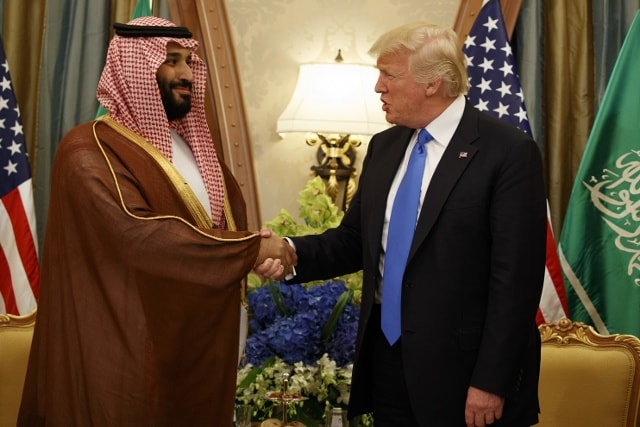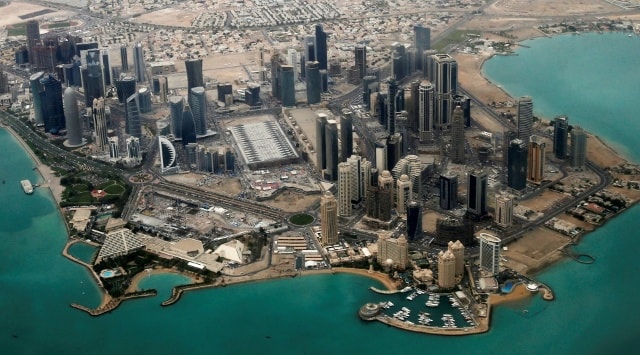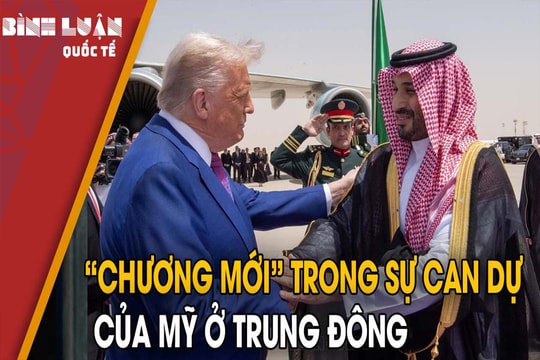Qatar crisis reveals Middle East mystery
(Baonghean.vn) - The diplomatic crisis between the monarchies in the Gulf region, with the main confrontation between Saudi Arabia and the United Arab Emirates (UAE) with Qatar, can be settled in the short term but is unlikely to be resolved in the long term.
 |
| US President Donald Trump and Saudi Prince Mohammed bin Salman. Photo: AP |
Mediating countries like Kuwait and the US can help the Gulf conflicting parties reach face-saving compromises, and Doha may accept some of the 13 demands set by the four Gulf countries, but the fundamental differences between the two sides will not be easily reconciled.
Let's explore the roots of the Middle East crisis through an article by Professor Gregory Gause III, who specializes in international affairs at the University of Texas, USA.
For those who view the current regional crisis in the Middle East through sectarian lenses, the fact that Iran was so quick to jump to Qatar's defense is yet another example of the larger conflict between the two major sects of Islam, Sunni and Shiite.
The fundamental conflict is not really about Iran, but about the very different understandings of how Muslims relate to government among the Sunni powers of the Middle East. Qatar, the UAE and Saudi Arabia are majority Sunni countries ruled by Sunni kings, but have very different positions on the issue. Türkiye and Egypt, the two largest Sunni republics, are also divided.
In a recent article, the author argues that the inability of Sunni countries in the Middle East to form an effective coalition against Iran stems from differences in the nature of the threats they face.
Qatar and Türkiye, the UAE and Egypt, and Saudi Arabia represent three different forces in this thorny question. The Qatar crisis is only the most recent and most visible manifestation of this internal Sunni conflict.
Qatar and the Muslim Brotherhood
Qatar bet on the rise of the Muslim Brotherhood in the Arab world before the Arab Spring, providing support to Brotherhood groups across the region; safe haven for exiles like Egyptian preacher Yusuf al-Qaradawi and Hamas leader Khaled Mashal; and a platform for Sunni democratic and electoral views on the Al Jazeera network's regional satellite channels.
The Sunni democratic Islamist view, while certainly not liberal democracy, also seeks power through electoral means. This vision is shared by Turkish President Recep Tayyip Erdogan, who saw the success of the Muslim Brotherhood in the wake of the Arab Spring as a possible bloc of similar regimes, with Türkiye at the forefront.
A post-Assad Syria would be the next member of the bloc, which is why Turkish President Erdogan was the first regional leader to call for the Syrian president to step down.
 |
| The Qatar crisis is actually exposing the conflicts within the “family” of Gulf countries. Photo: AP |
Ideological conflicts in the region
Sunni states cannot coordinate their actions because, while they may be concerned about Iran, they see each other as potential threats to the stability of their domestic regimes. Egypt and the UAE see the Muslim Brotherhood as their primary threat, which means they see Qatar and Türkiye as allies of those enemies.
That is why Cairo and Abu Dhabi are so determined to force Doha to shut down Al Jazeera. The Saudis worry that Qatar, which officially shares the Wahhabi Salafi brand of Islam (a Saudi-originated form of Islam), could interfere in their internal politics, thereby mobilizing more opposition to their regime.
Egypt is reluctant to back Saudi Arabia's efforts to topple President Bashar al-Assad's regime in Syria, fearing that Islamist groups like the Muslim Brotherhood will benefit. Saudi Arabia has historical ties to the group but has recently distanced itself from it, viewing populist, electoral Islam as a domestic threat.
Türkiye, meanwhile, fears that successful pressure on Qatar could lead to regional pressure on itself. Turkey and Saudi Arabia have been on the same side in the regional fight against IS and al-Qaeda, but cannot control or trust the Salafi Islamist militants who seek to overthrow them at home.
President Donald Trump’s vision of a Sunni world united with the United States against both Iran and terrorism is unworkable as long as the Middle East’s Sunni regimes maintain different views on the relationship of Islam in politics. In a Middle East supposedly dominated by a sectarian Sunni-Shiite conflict, Sunnis cannot work together.
The Gulf Arab states are often compared to a big family with many ruling families intermarried and having long-standing relationships since the oil era, and have not yet transformed poor fishing villages into metropolises filled with skyscrapers. So the Qatar crisis is actually exposing the conflicts within this “internal family”./.
Lan Ha
(According to Washington Post)
| RELATED NEWS |
|---|



.png)
.jpg)



